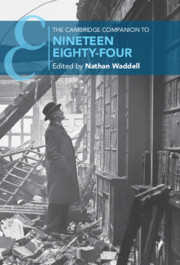Book contents
- The Cambridge Companion to Nineteen Eighty-Four
- The Cambridge Companion to Nineteen Eighty-Four
- Copyright page
- Contents
- Figures
- Contributors
- Acknowledgements
- Chronology
- Abbreviations
- Introduction
- Part I Contexts
- Part II Histories
- Part III Questions
- Part IV Media
- 13 Nineteen Eighty-Four on Radio, Stage, and Screen
- 14 Making Nineteen Eighty-Four Musical
- 15 Nineteen Eighty-Four and Comics
- 16 ‘In this game that we’re playing’
- 17 Coda
- Further Reading
- Index
- Cambridge Companions to …
16 - ‘In this game that we’re playing’
Nineteen Eighty-Four and Video Games
from Part IV - Media
Published online by Cambridge University Press: 18 September 2020
- The Cambridge Companion to Nineteen Eighty-Four
- The Cambridge Companion to Nineteen Eighty-Four
- Copyright page
- Contents
- Figures
- Contributors
- Acknowledgements
- Chronology
- Abbreviations
- Introduction
- Part I Contexts
- Part II Histories
- Part III Questions
- Part IV Media
- 13 Nineteen Eighty-Four on Radio, Stage, and Screen
- 14 Making Nineteen Eighty-Four Musical
- 15 Nineteen Eighty-Four and Comics
- 16 ‘In this game that we’re playing’
- 17 Coda
- Further Reading
- Index
- Cambridge Companions to …
Summary
Traces of George Orwell’s critiques of totalitarian society, in both blunt and subtle forms, exist throughout video games. Major themes of dystopia, surveillance culture, technologies of control, authoritarianism, and the oppression of a large underclass exist in innumerable game narratives and environments. Do games like the BioShock series (2007– ), Remember Me (2013), Watch Dogs series (2014– ), We Happy Few (2018), Orwell (2016–), Inside (2016), and Papers, Please (2013) encourage critical thought around the eventuality of totalitarianism, of which Orwell warned? Or, are these games merely systems in which to practise a kind of entrapment, in which so-called ‘freedom’ may be performed within a medium that is exceedingly ordered in its very constitution? Through the stories games tell, as well as in the very form of video games, is it even possible to truly stimulate a model of criticality? This chapter proposes that the critical influence of Nineteen Eighty-Four exists not only in video game narratives and the constitution of their navigable spaces, but also in the wide variety of strategies, rule-based systems, rhetorical capacities, ethical problematics and – most importantly – their strategic kinds of failure.
Information
- Type
- Chapter
- Information
- The Cambridge Companion to Nineteen Eighty-Four , pp. 247 - 264Publisher: Cambridge University PressPrint publication year: 2020
